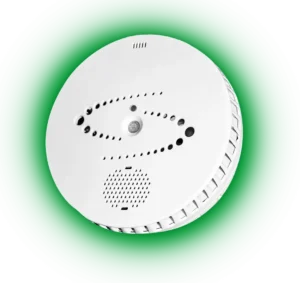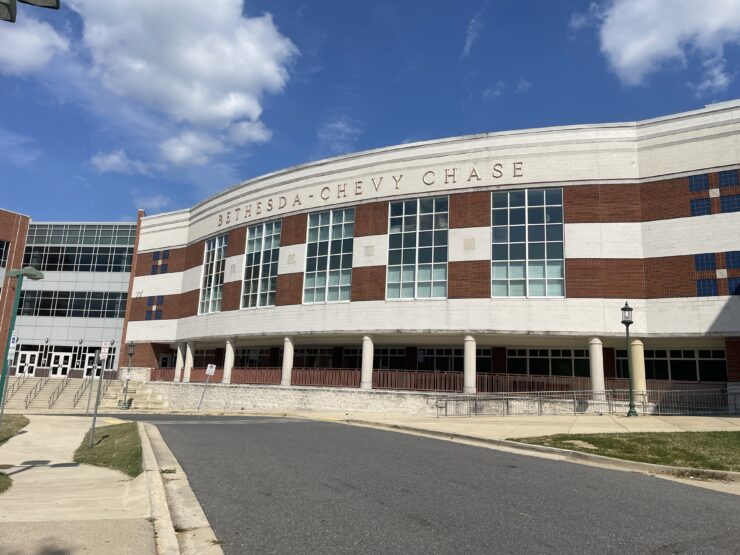The Bethesda-Chevy Chase High School, a sprawling brick building covered in windows, looms over East-West Highway in Bethesda, Md. Home to roughly 2,300 students, school safety, including drug prevention, is important to officials.
The high school, located in Montgomery County, will be one of many in the county to receive vape detectors in its bathrooms this school year, though the timeline of installation is unknown at this time.
County officials are currently looking into utilizing 2 million dollars from a settlement between several Maryland County Schools and the vape company Juul. The schools involved reported that the company marketed vaping to children, in part due to the flavors of e-cigarettes advertised.
This year, The Maryland Department of Health released The Youth Tobacco Report. The study states that 14% of high school students in the state use e-cigarettes. “Nearly 50% of high school students who use tobacco reported using menthol tobacco products,” the report said. “Ninety-seven percent of those who use electronic smoking devices usually vape flavors other than tobacco flavors.”

Shelton L. Mooney, Principal of Bethesda-Chevy Chase High School, said in an interview that he is “hopeful” that the school will have the vape detectors this year.
“I am also hopeful that it’s a technology that works,” Mooney said. “Yes, I’ve heard kind of the horror stories about the technology not working well, and I would hope that whatever we’re doing is something that is going to actually give us more positive results than false positive results.”
Montgomery County issued a vape detector pilot program in five high schools last year to test the devices. This initiative allowed the county to “know what works, what doesn’t work,” as President of the Montgomery County Board of Education Karla Silvestre said.
Mooney added that the discussion of these detectors has been ongoing for several years to ensure the community’s safety.
“From a broader picture kind of point of view, high schools, particularly the vape detectors, have been an ongoing conversation over the past two or three years amongst high school principals, even with MCPSs safety and security, as we continue to look for ways to kind of address those concerns that are arising in students and make sure that we’re providing a safe environment for everyone,” he said.
Silvestre, who is also the mother of a Bethesda-Chevy Chase High School student, said the county is now “ready to utilize that money and the lessons learned from those pilots to begin to install the vape detectors.”
The president heard feedback from students regarding the influx of vaping occurring in bathrooms before the pilot program was implemented.
“It’s so hard to control because, you know, it’s just so easy to put in your backpack and your pocket,” Silvestre said. “You know, kids were complaining to us that it was out of control, that they would walk into a bathroom, and it was just vape smoke everywhere.”
The initial pilot program allowed not only students to see that measures were being taken, but also showcased to Montgomery County how the detectors worked. According to HALO, a vape detector manufacturing company, the tool senses “the unique chemical compositions of various aerosols, including vape smoke and THC.”
When the sensors go off, school officials will then be notified and respond, says Silvestre, who also says some of the settlement money will allow a few schools in the county to hire personnel that will be directly responsible to respond to alerts.

On Aug. 20, Silvestre and the rest of the Board of Education sent a letter of recommendation to Superintendent Thomas M. Taylor to appropriate the 2 million dollars towards vape detections, pending the County Council’s approval.
“As a result of ongoing serious incidents within MCPS and throughout the nation, it is imperative to enhance safety and security in all schools and seek opportunities to address areas for improvement that can increase efficiency, reinforce policies, mitigate hazards, and reduce risks,” the letter read.
Though this may not be foolproof to always detect and stop vaping, as well as the sensors picking up other chemicals in the air, the installation of the tools does provide hope to decrease vaping of minors at not only Bethesda-Chevy Chase, but all Montgomery County schools participating.
“So, we just want to have a tool that we can use to kind of signal, even if it doesn’t do away with it 100%, but it really signals to students that this is not acceptable, and we’re going to be monitoring it more carefully,” Silvestre said.
On Wednesday, Sept 4, the county held a media briefing narrowing in on the exploration of ideas to keep school communities safe throughout the year. According to an email sent from Montgomery County in a press release, reporters had the opportunity to listen to Montgomery County officials, including Chief Administrative Officer Rich Madaleno.
Though implementation cannot start until County Council’s approval and there are no specifications for this in upcoming agendas, officials are still hopeful the detectors’ installations will begin soon.
“I’m confident that the county council will pass the supplemental budget amendment that’s before them,” Madaleno said in the briefing.
As principal of the high school, Mooney strives for good education and safety measures to be in their best shape during the academic year.
“My hope is really the same this year as it is for every year that you know, every student, every staff member who walks in the building leaves at the end of the day safe and having been able to experience a good education, a good educational environment,” Mooney said.
As a parent, Silvestre believes safety starts with the power of the students in the school community.
“I think the students themselves are so powerful in terms of the say, you see something, say something strategy, right,” she said. “I just think that we really need to use the power of the students that acknowledge that they have with the See Something, Say Something to be able to prevent bad things from happening in schools.”















Add comment